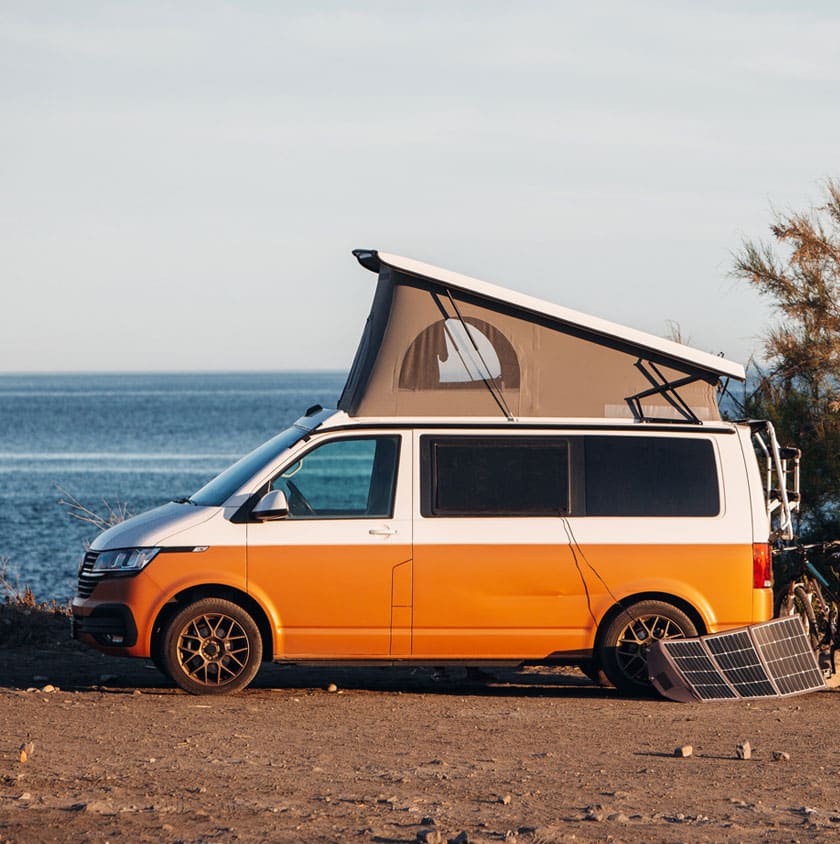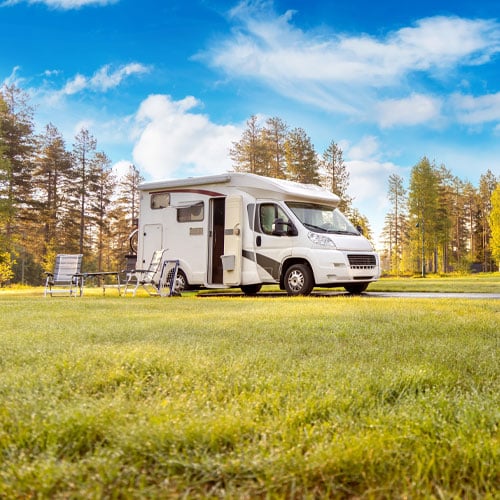
Campervan Insurance
Compare Campervan Insurance Quotes
- Complete one short form
- Quickly compare quotes
- Find a great deal today

Compare campervan insurance quotes from the UK’s leading insurers including;
Why Compare Campervan Insurance Quotes At SimplyQuote.co.uk
Campervan insurance isn’t one-size-fits-all—comparing quotes through simplyquote.co.uk helps you find cover that suits your vehicle, your lifestyle, and how you actually use your camper.
We’ve partnered with Quotezone to bring you fast, tailored results from FCA-regulated insurers who specialise in this space.
Unlike standard van or car policies, campervan insurance needs to reflect the fact that your vehicle is both transport and temporary home. Whether you’re hitting the road for weekends or longer European trips, you’ll need cover that protects more than just the shell.
Through our smart comparison tool, you can see side-by-side options for factory-built vans, self-conversions, and even classic campers. You’ll be able to specify modifications, add-ons like contents protection, or breakdown cover for long-distance travel—and get quotes that reflect those real-world needs.
We make the process quick, clear, and focused on the way campervan owners actually live and drive. No guesswork, no mismatched cover—just tailored insurance that fits how you use your van.
What Do I Need To Get A Quote?
To get a campervan insurance quote, you’ll need basic details about your vehicle, how it’s used, and where it’s kept.
It only takes a few minutes if you’ve got the information ready. Here’s what you’ll typically be asked for:
- Your campervan’s registration and make/model – So insurers can identify the vehicle, its value, and factory specs.
- Vehicle use and mileage – Whether it’s for holidays, everyday use, or occasional weekends, plus estimated annual mileage.
- Modifications or self-build status – Details of any changes to the bodywork, interior, or mechanicals—especially for converted vans.
- Overnight storage – Where the vehicle is parked when not in use, such as a driveway, garage, or secure compound.
- Driver history – Licence details, claims or convictions, and no-claims bonus information.
You won’t need to upload documents during the quote stage, but the more accurate your answers, the more tailored (and competitive) your quotes will be.
Why Do I Need Campervan Insurance?
Campervan insurance is a legal requirement if your vehicle is used or parked on public roads, and it also protects you financially if something goes wrong while travelling.
Unlike regular cars or vans, campervans carry personal belongings, modifications, and often double as temporary accommodation.
A standard motor policy won’t account for fitted kitchens, sleeping areas, or long-term storage of tools, bikes, and travel gear. That’s why campervan insurance is built differently—it recognises that your vehicle is more than transport.
If your camper is stolen, damaged, or involved in an accident, a dedicated policy helps you recover the costs of repairs, replacements, or third-party claims. It can also include breakdown support, onward travel cover, and even compensation if your trip is cut short.
From converted vans to classic VW campers, having the right cover in place isn’t just about meeting legal obligations—it’s about making sure your lifestyle on the road is protected too.

What Types Of Campervans Can Be Insured?
Most campervans can be insured, including factory-built models, converted vans, classic campers, and even self-build projects—provided they meet road-legal and safety standards.
Whether you travel full-time or just for weekend breaks, there’s a policy out there for your setup.
Insurers understand that no two campervans are exactly alike. Some are professionally converted by recognised brands, while others are hand-built with care by their owners. As long as your vehicle is classified correctly, roadworthy, and used for leisure purposes, it’s usually eligible for cover.
That includes:
- Volkswagen Transporters
- Ford Transit conversions
- Mercedes Sprinters
- Self-build campervans
- Japanese imports (like Mazda Bongos)
- Classic models like the VW T2 or Bedford Dormobile
You’ll need to be clear about any modifications, whether the conversion is permanent or removable, and whether the DVLA has reclassified the vehicle as a “motor caravan.” These details help insurers price your policy accurately and ensure you’re fully protected on the road.
What Does Campervan Insurance Cover Include?
Campervan insurance typically includes protection for your vehicle, your belongings inside it, and any damage or injury you may cause to others while on the road.
It’s built around how campervans are actually used—not just how they’re driven.
Here’s what’s usually included:
- Third-party liability – Covers injury or damage caused to others. Legally required for all road use.
- Accidental damage – Repairs your camper if it’s damaged in an incident, even if it’s your fault.
- Fire and theft – Covers loss or damage due to fire, attempted theft, or vandalism.
- Windscreen cover – Repairs or replaces cracked or broken windows.
- Personal belongings – Covers items like cookware, bedding, and camping gear kept inside the camper.
- Legal expenses – Helps with solicitor costs following a claim or dispute.
- Recovery or onward travel – Some policies include support if your trip is cut short or the vehicle breaks down.
Standard van insurance won’t cover fitted interiors or travelling with personal items. Campervan cover is tailored for life on the road—protecting the vehicle, the experience, and everything in between.

Can I Add Extras Like Contents Or European Travel Cover?
Yes, most campervan insurance policies can be tailored with extras like contents protection, European travel cover, and breakdown assistance.
These optional add-ons give you more control over how your policy works when you’re on the road.
Here are some of the most popular extras:
- European cover – Extends your protection when travelling across EU countries, often up to 90 days per trip.
- Contents cover – Protects personal items inside the campervan, including clothing, cooking equipment, and tech.
- Breakdown cover – Recovery assistance in case of mechanical failure, with onward travel or hotel costs sometimes included.
- Windscreen and glass cover – Repairs or replaces cracked or broken windows without affecting your no-claims bonus.
- Key cover – Pays for replacement and locksmith services if your keys are lost or stolen.
- Legal expenses cover – Helps with costs if you’re involved in a legal dispute following an accident.
Adding these extras can improve peace of mind, especially if you rely on your campervan for extended trips or overseas travel. Just be sure to check what’s already included in the base policy before adding anything you might not need.
What’s Not Included?
Campervan insurance won’t usually cover wear and tear, undeclared modifications, or using your van in ways not agreed in the policy.
Knowing what’s excluded can prevent expensive surprises later.
While each insurer’s terms differ slightly, here are common exclusions to watch out for:
- Full-time living – Most policies don’t cover campervans used as your permanent residence unless explicitly stated.
- Undeclared modifications – Any alterations not listed at quote stage may void your cover.
- Business or commercial use – If you’re using your campervan for work or hire, you’ll need a different type of insurance.
- Wear and tear – Gradual damage, such as rust or mechanical breakdowns through age, are not typically covered.
- Unattended theft – If items are stolen from an unlocked vehicle or one without visible signs of forced entry, claims may be denied.
- Driving outside of agreed regions – Travelling beyond the agreed countries (e.g. outside the EU without additional cover) can invalidate your policy.
The best way to avoid issues is to be upfront about how your campervan is used, what you keep in it, and where it’s stored. Transparency leads to better protection—and fewer headaches if you ever need to claim.

How Much Does Campervan Insurance Cost?
Campervan insurance typically starts from around £200 to £400 per year for standard cover, but your price depends on your van, how it’s used, and what’s included in your policy.
Premiums can vary widely based on risk and level of protection. If you only use your campervan for weekend breaks and park it securely, your premium will be lower than someone living in their van full-time or travelling across Europe. Extras like breakdown cover or high-value contents insurance will also increase your cost.
Expect to pay more if you:
- Drive long distances or keep high annual mileage
- Insure a classic or imported model
- Park on the street instead of a driveway or garage
- Have made claims in the past
- Need extended European cover or multiple drivers
- Store expensive personal items inside the camper
A stripped-back policy might save money short term—but may fall short in the event of theft, fire, or travel disruption. Comparing quotes ensures you get the best value for how you actually use your van.
How Can I Save Money On Campervan Insurance?
You can reduce the cost of campervan insurance by improving security, adjusting your cover, and making sure your policy reflects how you actually use your van.
Many owners pay more than they need to—especially when they copy-paste car policy habits.
Insurers calculate your premium based on risk factors, driving history, and the van itself. But there are simple, effective ways to bring your costs down:
Limit your mileage
Lower annual usage often leads to lower risk and cheaper cover.
Park securely
Storing your van in a garage or gated compound helps reduce theft risk.
Increase your voluntary excess
Taking on more of the risk can lower your premium.
Join a campervan club
Memberships often unlock insurer discounts or exclusive schemes.
Only pay for what you need
If you don’t travel abroad or carry expensive items, skip the extras.
Be honest about modifications
Accurate declarations reduce the risk of invalidating claims.
Above all, don’t rely on a single insurer to set the benchmark. Comparing quotes puts you in control, especially if your campervan is self-built, imported, or used irregularly. A tailored policy doesn’t have to mean a higher premium—it just needs to be the right one.
How To Compare Campervan Insurance Quotes At SimplyQuote
Comparing campervan insurance quotes at simplyquote.co.uk takes just a few minutes—and helps you find cover tailored to how you use your van.
Whether you own a classic VW or a self-build conversion, the process is simple. Here’s how it works:
- Tell us about your campervan
Enter your registration, make and model—or add details manually if it’s a conversion or import. - Describe how you use it
Let us know if it’s for weekend trips, long tours, or occasional use. Mileage, storage, and travel habits all help tailor your quotes. - Add any extras you want
You can include options like contents cover, European driving, or breakdown assistance—depending on how you travel. - Compare tailored quotes instantly
View quotes from FCA-regulated insurers, side-by-side. Filter by price, cover level, or features. - Pick the policy that fits you
Once you’ve found a quote that suits your van and your journey plans, you can buy online in just a few clicks.
There’s no obligation and no hidden fees—just clear, campervan-specific policies from insurers who understand the lifestyle.
Frequently Asked Questions
Yes. Even if your campervan is off the road, you’ll need insurance or a valid SORN. Without either, you could face fines or vehicle seizure—even if it’s not being driven.
Yes, in most cases. If your campervan weighs under 3.5 tonnes, your standard category B licence is sufficient. Heavier vehicles may require a C1 entitlement.
Not directly. Most policies don’t exclude wild camping, but they may not cover claims arising from trespassing or unauthorised overnight stays. Always check your policy terms.
Yes. Many insurers will cover a converted campervan still classed as a van by the DVLA—but you must declare all modifications honestly during the quote process.
Not usually. Standard campervan policies cover personal belongings, not tools used for work. If you carry valuable equipment, you may need specialist tool insurance.
Yes. Most insurers allow additional drivers, but age, licence type, and driving history may affect your premium or eligibility.
Not by default. Most policies only cover your insured campervan. “Driving other vehicles” is typically excluded unless clearly stated—always check the certificate.
Yes. Many UK insurers cover imported campervans like Mazda Bongos or Toyota Hiaces, but premiums may be higher and parts availability may affect repair costs.
Written by Chris Richards
Page last reviewed on 1st April 2025 by Chris Richards